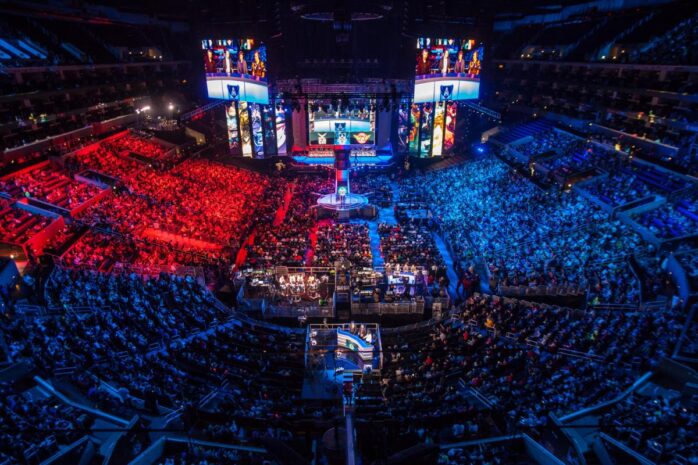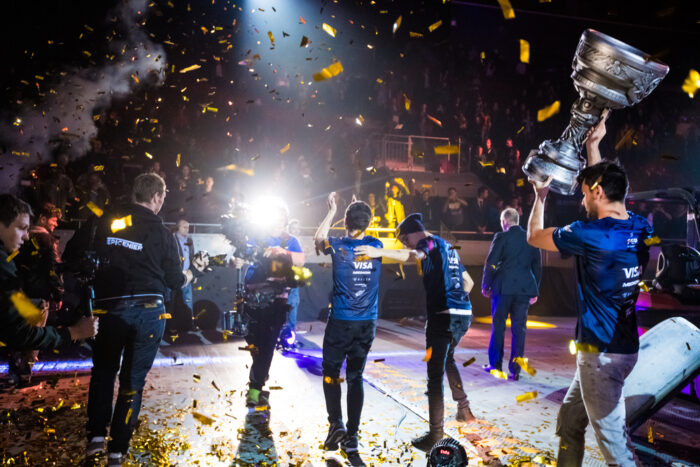
The journey of e-sports from its humble beginnings in basements and arcades to its current status as a mainstream phenomenon is a testament to the transformative power of digital gaming. Similar transformations are taking place in eSports-friendly industries, such as betting. Today, the best esports betting sites offer users a complete gaming experience and variety, making the betting experience more exciting. However, you should always remember the rules of responsible gambling and not plunge headlong into the excitement.
This text delves into the evolution of esports, exploring how technological advancements, changing attitudes, and strategic partnerships have propelled competitive gaming from the fringes to the global stage. From local LAN parties to sold-out arenas, e-sports’ ascent reflects the fusion of skill, passion, and community that has captured the hearts of players and spectators alike.

Emergence of Underground Competitions
Esports journey began in the underground, where passionate gamers organized and participated in local tournaments and LAN parties. Early competitive gaming scenes revolved around classic titles like “Street Fighter,” “Quake,” and “StarCraft.” These grassroots events, often held in basements and small gaming arcades, were characterized by an intimate and communal atmosphere. Players gathered not for the promise of fame or fortune, but for the sheer love of the game and the thrill of competition. It was in these dimly lit spaces that the foundations of e-sports were laid, setting the stage for a movement that would soon outgrow its subcultural origins.
As these underground competitions gained popularity, they became the testing grounds for emerging talents. Gamers showcased their skills, not for monetary gain, but for the recognition and respect of their peers. The sense of community fostered in these early events created a unique camaraderie among players, who shared a common passion for digital competition. The competitive spirit that flourished in the underground laid the groundwork for what would evolve into a global e-sports community.
Technological Catalysts and Streaming Revolution
Technological advancements played a pivotal role in elevating e-sports from niche to mainstream. The rise of online gaming platforms, improved internet connectivity, and the advent of streaming services like Twitch provided a global stage for e-sports events. Real-time broadcasting, live commentary, and audience interaction transformed the spectator experience. Suddenly, viewers could tune in from around the world to witness the skill and strategy of their favorite players. The streaming revolution not only broke down geographical barriers but also introduced a level of accessibility that was previously unimaginable. As e-sports events became a digital spectacle, the mainstream audience started to take notice, marking a significant turning point in the industry’s evolution.
Streaming platforms not only provided a platform for professional players to showcase their skills but also allowed aspiring gamers to learn and improve by watching the best in the world. The interactive nature of streaming, with real-time chat and engagement, created a sense of community on a global scale. This democratization of access to high-level gameplay fueled the growth of e-sports, as enthusiasts turned into dedicated fans and participants.

Global Recognition and Investment
E-sports’ ascent to the mainstream garnered attention from global audiences and attracted significant investment. Major companies, celebrities, and mainstream media started recognizing the potential of competitive gaming. Partnerships and sponsorships flooded in, enabling the professionalization of e-sports leagues and tournaments. The shift from small-scale events to grand productions in large arenas marked a seismic change. E-sports events began receiving coverage on major television networks, further bridging the gap between the gaming subculture and the mainstream. The influx of investment not only elevated the production values of tournaments but also increased the stakes for players, solidifying e-sports as a legitimate and lucrative career path.
Investment in e-sports also led to the establishment of professional leagues and franchises, mirroring the structures of traditional sports. City-based teams competed in organized leagues, fostering a sense of regional pride and familiarity for fans. The injection of capital allowed for the creation of state-of-the-art gaming facilities, training programs, and player support systems, raising the overall standards of professionalism within the industry.
Celebrity Endorsement and Cultural Impact
Celebrity endorsements and participation in e-sports further propelled its integration into mainstream culture. Celebrities, athletes, and musicians embraced e-sports, participating in events, investing in teams, and streaming their gameplay. This crossover between the gaming world and popular culture brought a new level of visibility and legitimacy to e-sports. It was no longer confined to the gaming community; it became a cultural force influencing fashion, music, and entertainment. E-sports tournaments became star-studded affairs, with red carpets and celebrity appearances adding glamour to the competitive gaming landscape. This cultural impact not only expanded the reach of e-sports but also broke down stereotypes associated with gamers.
The influence of celebrities extended beyond individual endorsements and investments. Major sports franchises, seeing the potential in e-sports, started to invest in their teams or create their franchises. The collaboration between traditional sports and e-sports not only increased the mainstream appeal of competitive gaming but also facilitated cross-promotion, attracting fans from both worlds.

Conclusion
In conclusion, the journey of e-sports from basement obscurity to championship glory is a remarkable tale of passion, innovation, and community. The emergence of underground competitions laid the groundwork, fostering a sense of camaraderie among gamers. Technological catalysts and the streaming revolution opened the floodgates, transforming e-sports into a global spectacle. Global recognition and investment elevated competitive gaming to new heights, while celebrity endorsement solidified its place in mainstream culture.
As we reflect on this journey, it’s evident that e-sports has not only transcended its niche origins but has become a cultural phenomenon with far-reaching impacts. From the basement to championship arenas, the narrative of e-sports continues to unfold, promising an exciting future where the lines between virtual and traditional sports will continue to blur. The journey is ongoing, and as technology advances and new generations embrace gaming, e-sports is poised to reach even greater heights on the global stage.











